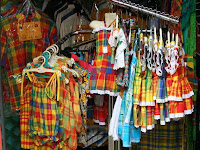No matter where I go in the world, it never ceases to amaze me when I see something that reminds me of an entirely different culture often from an entirely different part of the world. Pretty intriguing stuff if you ask me. (You're asking me, right?) *Eye twinkle* Naturally, my recent trip to Martinique was no exception.
When I arrived at Hotel Diamant Les Bains, a modest yet charming bungalow-on-the-beach-kinda-place in the southwestern part of Martinique, I spotted a photo that I fell in love with gracing the hotel walls and found myself wondering how a Martiniquan man managed to get ahold of what looks exactly like a Mexican sombrero. As my blogger buddy Liz would say: What the maracas?!?!?!?
It didn't take me long of course to realize (yet again) that we all do the same dances just to a different beat. Translated: We all wear the same hats, just from different cultures. Same hat, different head. Check these out:
| MARTINIQUE |
 |
| MEXICO [Source] |
 |
| HAITI |
 |
| HAWAII |
 |
| GHANA |
 |
| MOROCCO |
And then I got to thinking about plaid.
Walk into any souvenir shop (or fabric store for that matter) in Martinique (which I did) and you'll see everything from Western-style clothing in a Madras (plaid) print to souvenir dolls and even Brown (!) mermaids with Madras print fishtails (I bought two). Makes sense, though. If you look at the traditional costumes of Martinique, Guadeloupe, St. Lucia, Dominica and other parts of the French West Indies, they are all comprised of a madras head-tie or head piece and a madras skirt with lace petticoats draped at the sides. BuyDominica.com says that madras began appearing in the French West Indies towards the end of the 18th Century. Its design is believed to have originated from Southern France, where the women at the time wore a similar outfit. In the Caribbean, the dress is considered a significant aspect of culture and heritage. Love it! Love this too:
 |
| Guadeloupan Dance Troupe (in France) [Source] |
 |
| Did you know the MASAI of EAST AFRICA wear tartan plaid!? [Source] |
 |
| Naturally, there is the Scottish kilt. Scotland was the origin of tartan plaid and is fundamental to Scottish identity. |
 |
| Lungi is a Bengali term for a garment that is worn around the waist by people in Bangladesh, India, Myanmar and Sri Lanka. The Lungi is worn by large number of diverse communities across many parts of Southern Asia although the origin of this typical wear was in South India. The most commonly used styles are either plaid or solid colored, mainly because these patterns of lungi are much cheaper to produce with the loom. In terms of colours, blue is the most popular because it has the capability to fade to pleasant tones in contrast to other different colours. [Source] |
 |
| Bollywood actresses Rani Mukherjee and Vidya Balan of INDIA rocking plaid saris. Inspired by lungi? [Source] |
 |
| King of Bhutan Many of the men in Bhutan wear plaid. |
 |
| Member of the Queen's Band, CANADA, wearing Royal Stewart tartan. [Source] |
 |
| Harajuku Girls in JAPAN sporting plaid. Even the luggage is plaid! LOL [Source] |
 |
| Young Girl in Plaid Dress / Boston, MA, USA Date: c. 1861-1865 [Source] |
 |
| And then of course, there is plaid on runways around the world. |
 |
| You are likely to find children in various patterns of plaid school uniforms everywhere in the world. [Source] |
It's clear that plaid (whether Tartan, Madras, or something in between) is as much of a cultural representation as it is a fashion statement and is definitely here to stay. *Trying to remember where my plaid coat is*
As a Brown Girl that is mad about culture (in a good way), I am dedicated to OBG's mission which includes showing that we are all quite similar in our own unique way. Today, it's just hats and plaid. Tomorrow and forever after, I can pretty much guarantee that it'll be something else. =)





















0 comments:
Post a Comment